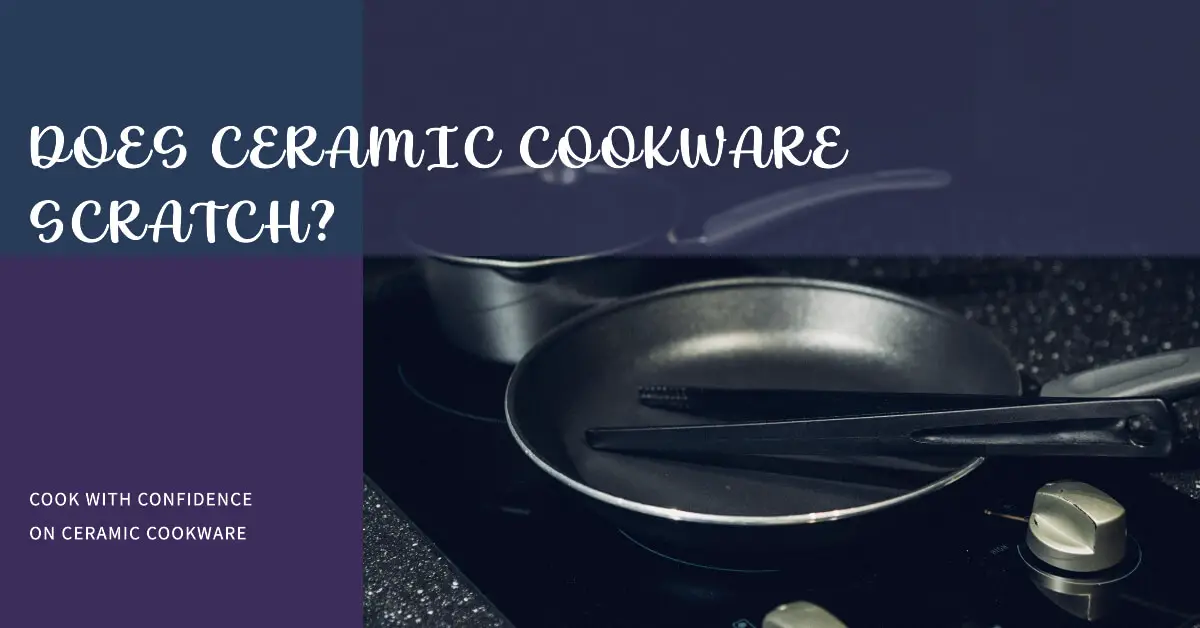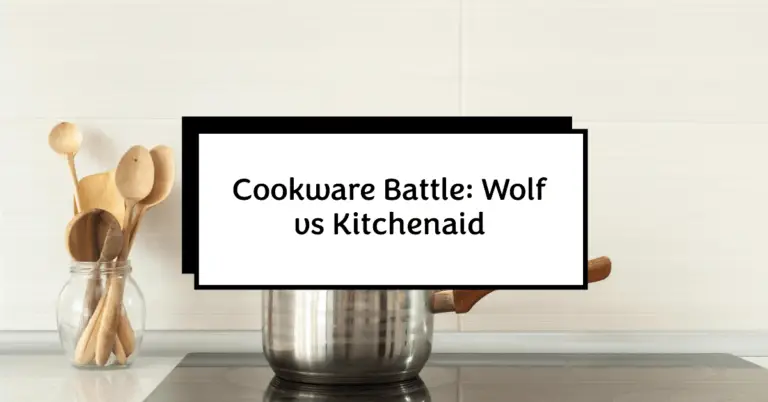Does Ceramic Cookware Scratch? The Surprising Truth

Kitchen cookware comes in all shapes, sizes, and materials – from stainless steel to cast iron to nonstick pans. But one popular material that home cooks love for its natural nonstick performance and durability is ceramic.
Ceramic pots and pans have grown in popularity in recent years as a safer and more sustainable alternative to traditional Teflon nonstick. Made from natural clay and coated for nonstick cooking, ceramic cookware is praised for its scratch resistance and longevity.
So does ceramic cookware scratch easily? The short answer is no – quality ceramic cookware is designed to be much more scratch resistant than other pan materials. While no cookware surface is completely impervious to scratches, ceramic offers superior durability that can last for years with proper care.
In this detailed guide, we’ll cover everything you need to know about how scratch resistant ceramic cookware really is. We’ll look at how ceramic holds up to metal utensils, abrasive scrubbing, daily cooking, and more. We’ll also provide tips to prevent scratches along with what to do if your ceramic pan does get scratched.
Let’s dive in and get the full story on avoiding scratches with ceramic pots and pans!
What Makes Ceramic Cookware Unique?
Before we look at scratch resistance, it helps to understand what makes ceramic different than other popular cookware materials like stainless steel, cast iron, copper, and nonstick pans.
Ceramic cookware is made from natural clay that is shaped and heat-treated at high temperatures. This process creates a nonporous, inert ceramic material that conducts heat evenly and efficiently.
The base ceramic material alone provides some natural nonstick properties. But most ceramic pans have an additional coating applied that enhances the nonstick performance significantly.
This ceramic nonstick coating is made from inorganic materials like silica, oxygen, and various metal oxides baked onto the pan surface. It provides an ultra-smooth cooking surface that makes cooking and cleaning easy.
Compared to traditional Teflon or PTFE-based nonstick pans, ceramic’s nonstick coating is much more durable, sustainable, and scratch resistant. It also does not contain concerning chemicals like PFOA found in older nonsticks.
In addition to nonstick properties, ceramic cookware offers several benefits:
- Even heating – Distributes heat smoothly and prevents hot spots.
- Easy cleaning – The nonstick surface releases food easily and wipes clean.
- High heat tolerance – Can be used on the stove, in the oven, under broilers up to temperatures around 600°F.
- Chemical-free – Does not leach chemicals or toxins into food.
- Environmentally friendly – Made from natural materials like sand, clay and water.
When it comes to scratches, the ceramic coating plays a key role in the material’s excellent durability. Let’s look closer at why ceramic resists scratches so well.
Why Ceramic Cookware is Scratch Resistant?
The main reason quality ceramic pots and pans resist scratches is due to the properties of the ceramic coating itself.
Ceramic coatings are applied in multiple super-thin layers and then hardened at high heat into an incredibly durable, glasslike finish. This process creates a surface that is highly scratch resistant for a number of reasons:
1. Extreme hardness
After heating, ceramic coatings take on properties similar to glass with extreme hardness and rigidity. This makes them very resistant to scratches from sharp objects. Ceramic ranks 7 or higher on the Mohs scale of mineral hardness. For comparison, steel pans are around 4-5.
2. Toughness
The durable ceramic surface does not scratch as easily as metals. Even if contacted with a sharp edge, it is less prone to scraping, peeling or chipping.
3. Smoothness
Ceramic coatings provide an ultra-smooth finish, especially compared to cast iron or stainless steel. This gives objects less surface area to “grip” and cause scratches.
4. Non-reactivity
Ceramic’s non-reactive surface helps prevent scratching from reactive ingredients like tomatoes, vinegar or salty foods. Materials like aluminum and copper can be etched by acidic foods if not cleaned promptly.
5. Inertness
The hardened ceramic layer is inert so it does not degrade or wear away easily with use over time. This maintains the cooking surface and scratch resistance.
6. Renewable layers
Quality ceramic cookware has multiple ceramic coating layers. If the top layer gets damaged, subsequent layers protect the pan and allow renewal of the top coating.
Thanks to these properties, quality ceramic pots and pans are highly scratch resistant for home cooking tasks. But how exactly do they hold up in real-world kitchen tests?
Scratch Resistance Against Metal Utensils
One key scratch test for any pan material is how it withstands metal cooking utensils. Metal spatulas, spoons, and tongs are common kitchen tools, so ceramic needs to be durable against them for scratch-free cooking.
The good news is ceramic cookware holds up quite well to metal utensils due to its hardness. The ceramic surface resists scraping from sharp metal edges better than softer scratch-prone surfaces like stainless steel or nonstick coatings.
With that said, metal utensils can still damage ceramic over time with repeated use. Small surface marks may accumulate after months or years depending on frequency of use.
For this reason, it’s still best practice to use wood, silicone or plastic utensils when cooking with ceramic pans. While an occasional metal utensil use won’t immediately scratch ceramic, exclusive long-term use of harsh metal tools can shorten the life of ceramic cookware.
Overall, ceramic’s durability and resistance to metal utensil scratches is superior to traditional nonstick pans. And with proper care, quality ceramic pots and pans can maintain their flawless scratch-free finish for years.
How Ceramic Holds Up to Abrasive Scrubbing?
Another scratch risk area for pots and pans comes from cleaning tools and abrasive scouring. Do scrubs and harsh cleaners damage ceramic cookware?
Again, the durability of the ceramic surface provides protection compared to other materials. Ceramic coatings strongly resist scratches from abrasive scouring pads, abrasive cleaners, and scrub brushes.
Light scrubbing during washing is unlikely to harm quality ceramic cookware. The tough coating prevents scratching and scraping from abrasion.
In fact, ceramic’s scratch resistance allows for more aggressive cleaning of stuck-on food than more delicate surfaces like stainless steel. You can safely use a little elbow grease to remove stubborn residue without worry.
That said, it’s still smart to avoid very harsh scrubbing pads that could wear down the finish over time with heavy repeated use. Gentler soft sponge or cloth cleaning protects ceramic’s longevity.
So in summary, the occasional use of mildly abrasive scouring won’t immediately damage ceramic like it would stainless steel. But best practice is to stick to gentle washing methods.
How Daily Cooking Affects Ceramic Pans?
Beyond cleaning and utensils, another key question is how the rigors of daily cooking affect ceramic cookware’s susceptibility to scratches.
Luckily, quality ceramic stands up well to typical stovetop cooking tasks like sautéing, simmering, frying, and more. The durable ceramic coating is designed to be highly functional for everyday use.
For example, activities like:
- Cooking eggs
- Sautéing veggies
- Simmering sauces
- Frying proteins
- Boiling water
Are very unlikely to scratch the surface of ceramic cookware as long as some basic precautions are taken:
- Maintain cooking temperatures under high heat tolerance levels
- Avoid metal utensil scraping
- Allow pan to cool before washing
- Gently hand wash
With this proper use and care, ceramic pots and pans can provide years of scratch-free daily cooking. While no material is invincible, quality ceramic stands up admirably to the demands of everyday kitchen use.
Minor surface marks and discoloration may develop over time with repeated cooking. However, these are merely aesthetic and won’t degrade the pan’s cooking performance. It takes significant scratching to damage the ceramic coating itself.
Proper use combined with gentle cleaning makes ceramic an extremely durable long-lasting material perfect for daily cooking needs.
Tips to Prevent Scratching Ceramic Cookware
To get the most scratch resistance and longevity out of ceramic pans, following some simple tips goes a long way:
- Use wood, silicone or plastic utensils – Avoid harsh metal utensils that can scratch and scrape the coating over time, even if ceramic is more resistant than other materials.
- Hand-wash gently – Skip the dishwasher and avoid super abrasive scouring pads. Use a soft sponge or cloth with mild soap and water.
- Don’t overheat – Maintain cooking temperatures below ceramic’s high heat tolerance to prevent cracking or burning.
- Allow to cool before cleaning – Let the pan cool down from cooking before scrubbing to prevent thermal shocking the ceramic.
- Don’t scrape with metal – Never use metal tools like spatulas to scrape out stuck-on food residue.
- Apply a little oil – Adding a small amount of oil helps food release more easily after cooking.
By following these simple ceramic pan care tips, you can enjoy scratch-free cooking for many years. While ceramic is highly scratch resistant, a little extra care goes a long way!
What if Ceramic Cookware Does Scratch?
Even with proper use and care, ceramic pans can eventually show some minor scratches, especially after years of daily cooking.
The good news is light surface scratches do not affect the performance or cooking ability of ceramic pots and pans. These are merely superficial imperfections in the exterior coating.
However, deep scratches that penetrate through the ceramic coating can be problematic. This damage can allow moisture to react with the underlying pan material, leading to further chipping or peeling.
Once the structural integrity of the nonstick ceramic coating is compromised, the performance of the cookware can rapidly deteriorate. Food and oil may start to stick, making cooking difficult.
For superficial scratches, the ceramic pan can be kept in use as normal. But if severe scratching, chipping or cracking occurs, the cookware will likely need to be replaced.
Look for ceramic cookware with full lifetime warranties that guarantee replacement in the event of defects. Top brands will back the durability of their ceramic with a strong warranty policy.
The Bottom Line on Ceramic Cookware Scratch Resistance
When it comes to answering “does ceramic cookware scratch easily”, the takeaway is clear:
Quality ceramic pots and pans offer superior scratch resistance compared to other leading cookware materials.
Thanks to the properties of the ultra-durable ceramic coating, ceramic stands up well to metal utensils, abrasive cleaning, and everyday cooking demands.
While no pan surface is completely immune to scratches, ceramic’s hardness, toughness, and smoothness make it highly resistant for years of use.
By following some simple care and cleaning methods, home cooks can enjoy ceramic’s excellent scratch resistant properties for a long time. Minor aesthetic scratches may occur but won’t affect cooking ability.
For cooks wanting natural nonstick ability paired with scratch-free durability, ceramic cookware provides a compelling option. Give ceramic a try for your kitchen and see how its excellent scratch resistance benefits your cooking!

